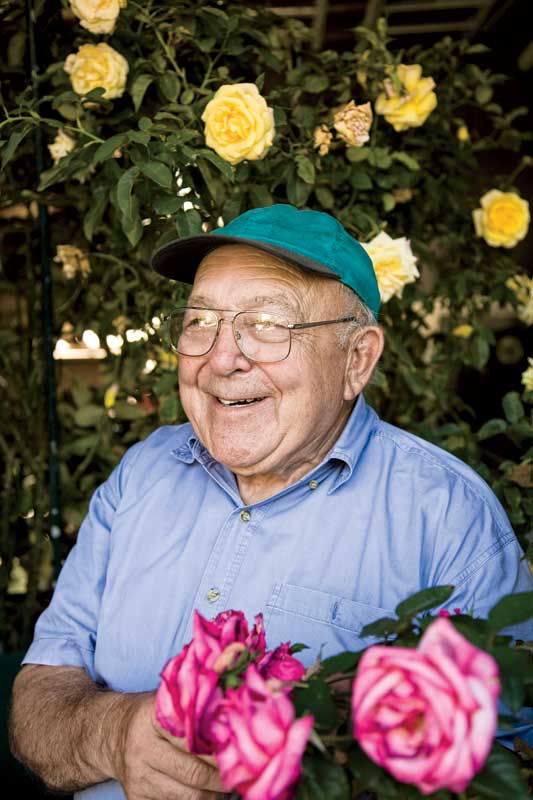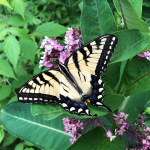The Big Question: We Ask Champion Rose Gardener Clarence Rhodes …
Clarence Rhodes, celebrated rosarian and longtime judge for the American Rose Society, lives in Portland, Maine, where this retired electrical engineer has dispelled the notion that New England’s harsh winters kill the prospects of anything outside of, say, an ‘Elina’, ‘Dublin Bay’, or ‘Hot Princess’. More than 250 bushes consume his backyard, line his driveway, […]

A passion for roses: Clarence Rhodes maintains more than 250 bushes--in a rainbow of colors and varieties--at his home in Portland, Maine.
Photo Credit: Tremblay, Carl
Photo Credit : Tremblay, Carl
Clarence Rhodes, celebrated rosarian and longtime judge for the American Rose Society, lives in Portland, Maine, where this retired electrical engineer has dispelled the notion that New England’s harsh winters kill the prospects of anything outside of, say, an ‘Elina’, ‘Dublin Bay’, or ‘Hot Princess’. More than 250 bushes consume his backyard, line his driveway, and take up real estate on his front lawn; the blossoms are a traffic-stopping, eye-popping display of color. We recently caught up with Rhodes while he was—what else?’tending his flowers.
“There’s a reason people love roses. You take a zinnia, they’re all zinnias, just with different-colored flowers. You can’t say that about roses. You have your hybrid teas, which is what I grow, your old garden roses, your rugosas. They’re 34 million years old, and through accidental pollination and hybridization, thousands have come into existence, with different shapes, curves, colors. Even how they grow can vary. Whenever a new catalogue comes out, I’ll just start flipping through it to see what the latest varieties are and whether or not I can grow them.
“A winning hybrid tea is a great piece of symmetry. It looks almost unreal, with a high pointed center and a round shape, with all its petals in a circular form. When you get one like that, you can’t believe something can be that beautiful. But it’s fleeting. A rose’s maximum point of beauty may last only two or three hours. That’s part of the challenge. You think, I’m going to do this because I want to see that.“
“You try things out and see if they work. For a long time I built frames around my bushes to winterize them–I got the idea from an old Maine farmer I knew–and they did very well. But I wanted to see if I could get them indoors. I was in The Home Depot, and I saw these 32-gallon plastic trash barrels. I figured that if I attached some wheels, I could have containers that wouldn’t rot and that would be easy to roll in and out of the garage. Now that’s what most of my bushes are in.
“That first week of November, I’ll take all the leaves off, water the bushes thoroughly, and let them sit out there until the soil freezes. Then I bring them inside, and with this huge mass of bushes together like that, the temperature around the plants doesn’t fluctuate. And because the soil is frozen, you don’t have to water them. Now I can grow any rose you’ll find in California. Did I know any of this before I started? No. But if you have an inquisitive mind, it’s great stuff to figure out.
“I always tell people: If you’re going to grow roses, you need a system. I have a friend in Connecticut who keeps a chart on when all of his roses are expected to bloom and how far in advance he should prune them so that they’ll bloom at the right time for the shows. Getting a rose to open up when and how you want it to is like an artist painting a picture.”
“When my wife was alive, we’d go out back in the morning and eat breakfast. We’d be around all these beautiful flowers, we’d smell their fragrance, and the rest of the world would just fall away. It’s so tranquil–how do you even describe it? People say to me, ‘Look at all the work you have to do.’ What work? Sure, it’s a lot of time, but when you get so engrossed in something that you forget about everything else, and then you finally accomplish what you were trying to do, it’s exhilarating. There will be days I’ll come outside and there are 2,000 blooms. You’ve never seen anything like it.
“It keeps me young. And it makes me feel as though I’m adding a little beauty to the world. Strangers stop by all the time to thank me for my roses, and if they have time, I’ll give them a tour of my yard. There was one lady who came by and said she was getting married and wanted to know if she could have some flowers. I gave her a bucketful.”
Read more: Rose-gardening tips and a “Yankee Classic” story on rosarian Suzy Verrier








On page 99 of spring issue it said “get expert advice from a champion rose grower..” so I am asking, I have a red Knock Out shrub rose and every year it attracts Japanese beetles. In fact they seem to head for it. Is it the color? There are other roses growing in other plots that do not seem to be bothered as much as mine. Is it the open nature of the flower as opposed to a multileaved flower? Please let me know as I want to get another bush and don’t want to attract those beetles!!
Hi Carole,
Sorry to hear you’re having issues with Japanese beetles.
Clarence’s advice is contained within this article — he’s not answering specific questions. However, here are three tricks to try for controlling those beetles: yankeemagazine.com/article/garden-home-3/japenese-beetle-control
Good luck!